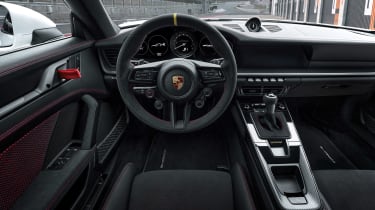New Porsche 911 GT3 RS misses out on Nurburgring record
It’s the quickest 911 GT3 RS yet, but it’s not enough to overthrow the old 911 GT2 RS at the Nurburgring
Porsche has taken the new 911 GT3 RS to the Nurburgring, setting a time of 6:49.32 minutes. That means the naturally-aspirated, rear-wheel drive GT3 RS is the fifth fastest production car to lap the “Green Hell”, tucking in just behind the old GT2 RS.
Conditions were apparently not ideal for the GT3 RS timed run, with a cool track and wind swirling around. However, the most hardcore, track-focused 911 you can buy right now (fitted with the optional Wiessach Package, of course) managed to reach speeds of 177mph, setting a time six seconds off the outright record - set by the Porsche 911 GT2 RS Manthey-Racing.
With this new GT3 RS, Porsche has strongly emphasised the connection between road and race car with the newcomer’s aerodynamic package including active elements. Along with these visible upgrades, there’s plenty that’s new under the wildly sculpted and slashed bodywork. Orders for the 911 GT3 RS can be placed now, with pricing starting from £178,500.
Power is provided by a naturally aspirated 4.0-litre flat-six engine that’s also used in the brand’s regular 911 GT3 and the new 718 Cayman GT4 RS. For the GT3 RS, Porsche has tuned the engine to produce 518bhp. Drive is sent to the rear wheels via a seven-speed PDK dual-clutch automatic transmission that features a slightly shorter final drive ratio compared with the regular GT3 for quicker acceleration. Porsche quotes 0-62mph in 3.2 seconds and a top speed of 184mph.
Knowing Porsche, the 0-62mph time quoted is possibly quite conservative, and while the 184mph top speed means that the new RS is actually slower than the regular GT3 when it comes to terminal velocity, that shouldn’t be of concern - this is a Porsche engineering project decidedly focussed on setting the fastest lap times possible, and as such, it’s the aerodynamic and chassis work that’s most impressive.
It’s almost impossible to ignore the aero changes given the startling visual transformation that has taken place for this new GT3 RS. Even alongside the latest GT3 - itself evolved to be more aggressive than ever in its current generation - the RS model sports several clear differences, with more aggressive aerodynamic and cooling packages.
Significant use of carbon fibre reinforced plastic (CFRP) in the bodywork means the RS weighs 1,450kg. Porsche claims that the new car develops twice as much downforce as its predecessor, and three times as much as the current GT3, with total downforce of 860kg at 177mph. One of the chief architects of this new figure is the huge, swan-neck rear wing at the rear, which dwarfs anything else fitted to even the most hardcore, track-biased 911s before it.
It’s so large that the upper element stands taller than the car’s roofline and is the GT3 RS’s highest point. It’s also an active aerodynamic part, with a hydraulically adjustable top element that can open to provide a Formula 1-style Drag Reduction System (DRS).
Elsewhere, a front splitter at the base of the front bumper extends out beyond the bodywork and is joined by sideblades that channel air around the car’s front corners. A combination of louvres on the top of the front wheel arches and inlets behind the wheels help reduce pressure under the front of the car, while there are also new, larger nostrils on the bonnet. These are placed prominently to draw air out from a repositioned central radiator, directly where the luggage compartment would be on other 911 models. Fins on the car’s roof direct air away from the centreline of the car, ensuring the rear-mounted intake is fed with cool, fresh air.
The RS features intakes in its rear wings purely to improve airflow rather than feed the engine with fresh air, while the diffuser at the rear is an evolution of the one found on the GT3.
With plenty of airflow over the front and rear axles of the GT3 RS, even its suspension components have been designed to contribute to producing downforce. The car’s track is 29mm wider as a result of extended control arms and wishbones, while the front double wishbones feature teardrop-shaped profiles for optimised airflow, contributing up to 40kg of downforce on their own.
The front ball joints on the lower trailing arms are set lower for a lower centre of gravity. Combined with spring rate changes on the multi-link rear axle, Porsche says pitching under braking has been reduced, which helps to maintain more consistent downforce. Alongside this, the rear-axle steering set-up has been retuned to be more ‘dynamic’.
Sitting behind forged light-alloy centre-lock wheels (20 inches at the front and 21 inches at the rear) are beefier brakes than used on the regular GT3, with front discs that measure 408mm in diameter, clamped by larger pistons within the six-piston caliper. The rear axle continues using 380mm disks with four-piston fixed calipers. Porsche Carbon Composite Brakes are offered optionally, featuring 410mm front discs and 390mm discs at the rear.
Driving modes include Normal, Sport and Track, with the Track mode offering up a comprehensive level of adjustability to change the GT3 RS’s driving dynamics. The adaptive dampers’ rebound and compression rates can be controlled separately and in several stages, while the differential’s lock-up characteristics can be adjusted using rotary controls on the multifunction steering wheel.
The two-seat interior uses a combination of black leather and Race-Tex upholstery, while the Clubsport package - including a steel rollcage, a fire extinguisher and six-point harness for the driver’s seat - will be available as a no-cost option.
Separately, Porsche will offer a Weissach package from £25,739, which includes a carbon-weave finish on the bonnet, roof, rear wing and mirrors, front and rear anti-roll bars made from CFRP, a rollover bar made from the same material (which saves around 6kg compared with a steel item), and paddles for the PDK gearbox that use magnets to make shifts feel ‘more tactile’. Magnesium forged wheels will also be available with the Weissach pack, while buyers can opt for the pack without the roll over bar for £22,515.
Check out the best track day cars to buy now...
Find a car with the experts











